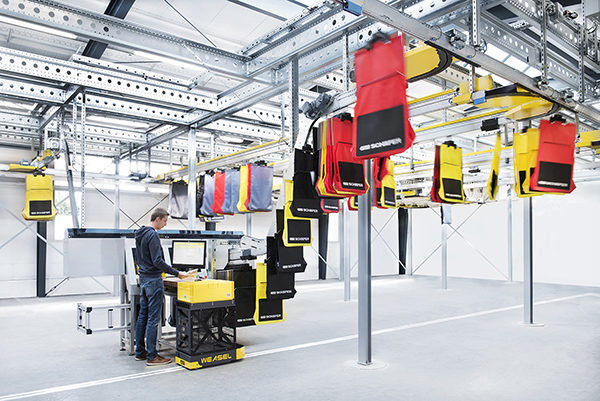SSI Schaefer introduces the SSI Carrier, a compact pocket sorter

With shorter consumer delivery times and increasing demands on logistics, conventional distribution and logistics processes are changing. Fast access to various warehouse inventories and qualified return goods products are now the new norm for retailers as they go to market competing for e-commerce shoppers. However, many retailers and wholesalers lack adequate space to meet new online shopping demands that typically warrant large automated systems. This ever-increasing scenario prompted SSI SCHAEFER to introduce a highly compact and flexible overhead conveying system—the SSI Carrier.
The SSI Carrier, a patent-pending overhead conveying system consists of a universal carrier, a circulating conveyor, an accumulation conveyor, and switches alongside workstations for loading and unloading of carrier units. SSI SCHAEFER opted for a standard component approach that easily interchanges with modular components as needed. The flexibility allows for complex picking, sorting, buffering, and sequencing in a cost-effective manner. The overhead SSI Carrier transports pockets, pouches, or hanging goods on maintenance-free rollers, reaching performance throughputs up to 10,000 carriers per hour. For returned goods, the SSI Carrier includes a dynamic returns buffer. Qualified returned goods are registered and placed in a pocket, pouch, or hung and fed into the system via a simple switch. From there, both returned goods and regular inventory are sequenced for order picking, ensuring the returned good is shipped out first.
The technology innovation extends throughout the system as well. An assigned RFID tag represents each carrier and routed throughout the system for easy inventory tracking. Furthermore, the entire system runs smoothly throughout the process—ensuring gentle transport of goods. The patent-pending conveyor was engineered to distribute flow equally throughout the entire system. This innovative design eliminates declines, which typically result in slowing or crashing goods in similar designs. The horizontal placement of pockets or hanging goods allows for optimum use of space. The new SSI Carrier system utilizes 10 percent less space and can encompass multiple levels when needed. The circulating conveyor, up to two kilometers (6,562 feet), connects the logistic modules. This new design enables a maintenance-free drive concept without disruptive transfer points or clamping devices—meaning more inventory processing in less space.
"The SSI Carrier system can handle an array of goods," highlights Klaus Hiesgen, director of HSP GmbH. "The speed of the conveyor is easily changed to accommodate different weights for products like pharmaceutical, cosmetics, electronics, food or even beverages. Anything up to three kilograms (6.6 pounds) easily transports. E-commerce has disrupted regular distribution for retailers and wholesalers alike with faster delivery times and access to qualified return goods inventory. With performances up to 10,000 carriers loads per hour and an optimized matrix sorting capability, SSI SCHAEFER offers both retailers and wholesalers a cost-efficient and space saving alternative to larger automated systems," continued Hiesgen.
About SSI Schaefer Systems International: SSI Schaefer Systems International engineers sophisticated automation systems, provides storage and materials handling, engineers and manufacturers reusable packaging and waste technology solutions to businesses throughout North America. SSI Schaefer Systems International designs innovative intralogistics storage and automation picking solutions for all types of industries as well as plastic containers, pallets, and waste and recycling carts. SSI Schaefer Systems International is part of the SSI SCHAEFER Group, a global leader in logistics and materials handling founded in 1937 with ten manufacturing facilities and offices in over 70 locations worldwide. For more information, visit www.ssi-schaefer.com and www.wamas.com.
Related Articles
Copyright ©2024. All Rights ReservedDesign, CMS, Hosting & Web Development :: ePublishing